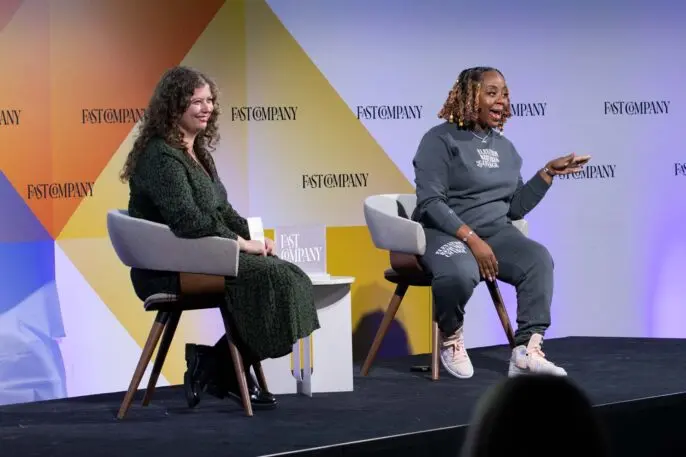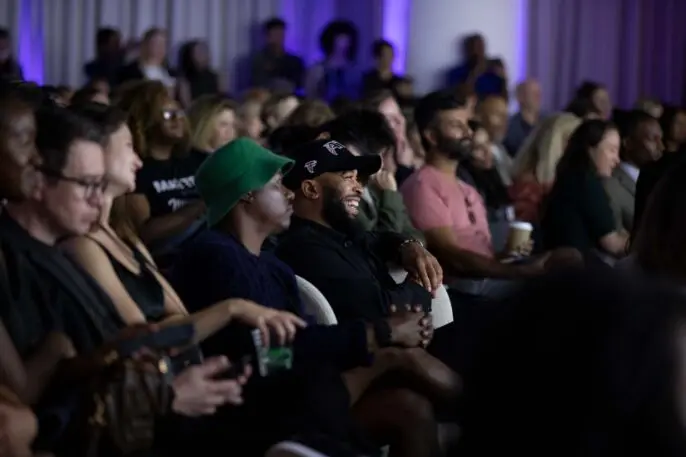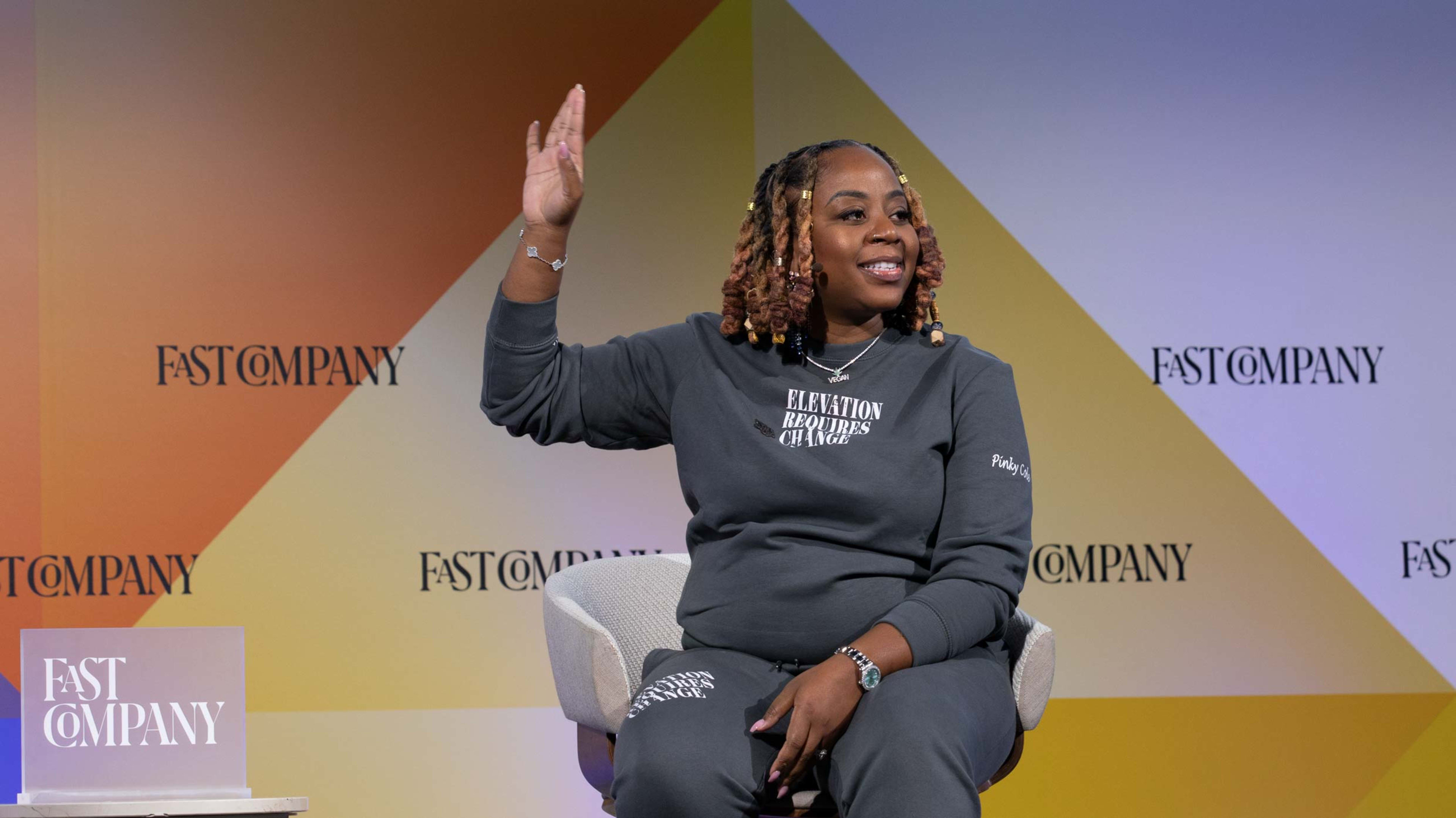Down in the Big Peach, there’s a burger-and-fry joint called Slutty Vegan. It breaks from the leafy aesthetic of many plant-based food restaurants—you need only get a whiff of its name to know that. Its firebrand logo pops like graffiti flames over puffy-looking sesame-seed buns, which are beckoning as if to say, you’re in for a treat. And you are, because Slutty Vegan is like if your environmental conscientiousness smashed with reckless decadence.
“When you go in, we’re gonna call you a slut,” Pinky Cole said this September at the Fast Company Innovation Festival. “It’s a term of endearment, by the way. We’re gonna dance with you, the music is booming through the speakers, you’re gonna have a really dope experience.”
Expect impeccable toilets, per Cole’s own rule of thumb: “When I go in a restaurant, the first thing I wanna do is check the bathroom. If the bathroom’s not clean, I’m not eating in that restaurant!”
In 2018, Cole, a former NBC television producer, founded Slutty Vegan as a sort of avant-garden for plant-based food. Originally a ghost kitchen, it took on a life of its own, fed by social media and word of mouth, growing into a food truck, then branching into a brick-and-mortar restaurant, now with 11 locations across Georgia, Alabama, Texas, and New York.
In 2022, it nabbed $25 million in Series A funding at a $100 million valuation, with investments led by Union Square Ventures—the capital arm of famed New York restauranteur Danny Meyer, whose résumé boasts celebrity-favored kitchens like Gramercy Tavern and Shake Shack (the latter of which collaborated with Cole on a veggie patty topped with a sauce of lemon ginger kale, caramelized onions, and vegan ranch and mayonnaise, served on toasted Hawaiian bread).

But like the multimillion-dollar food empire she’s built, Cole’s path to success could catch you by surprise. Speaking at the festival in New York, she began by telling the crowd, “I hope you fail. I hope you get fired. I hope you lose all your money. . . . These are all things that happened to me in real life, guys.”
Cole’s not bitter. Actually, she’s zeroed in on a new calling in life, which is to become your business guru—and she’s got wisdom to bestow.
“I’m a master failure artist,” she says. “I like to say that I went to ‘Harvard University of Failure.’ Like everything that I’ve ‘graduated’ from—and it might be the most expensive school that I’ve ever paid for—it was so worth it. Because it makes you smarter, it makes you stronger.”
After getting her degree from Harvard Failure (and Clark Atlanta University), Cole’s now cramming decades of lessons into a forthcoming book, I Hope You Fail. It’s not your typical classroom text. “Sometimes you read a book and it’s like watching paint dry,” says Cole. “I didn’t want that. I wanted something super practical for the people who are like, ‘Alright, I’m not a book-reader—but I’ll read your book.'”
Going from food mogul to self-help coach may seem out of left field, but for Cole, it’s right in line. Take Slutty Vegan, for example: “When you walk into the space, even if you’re sad or you’ve had a long day, I wanna feed you,” she said at the conference, “just like I’m feeding y’all right now with this good energy.”
And the energy in the audience is electric, because Cole has a powerful story to tell.
A coal-powered engine
Nearly a decade ago—well before Slutty Vegan—Cole was nursing her first food venture, Pinky’s Jamaican and American Restaurant, in Harlem. (“I was vegan at the time, but I was selling jerk chicken,” she jokes.) “I put my blood, sweat, and tears in this business, until one day I got a call from the fire department telling me there was a grease fire”—it razed her restaurant to the ground.
“It was the first time in my life I felt like I lost something,” she says.
Then, the losses tumbled forth. Her car got repo-ed. She got kicked out of her apartment. She got depressed. Now, she’s on stage to tell listeners that “one, it taught me to make sure you have fire insurance—I didn’t have it—and two, hard times don’t always last. There is a light at the end of the tunnel.”
“I’ve lost a lot of money,” Cole continues. “I’ve lost relationships. I’ve lost friends. . . . Along the way, I realized that all the pitfalls and tribulations weren’t ever really failures. We might decode them as failures, but it’s really an opportunity to navigate through life’s hardest times. When I talk about being an expert—you can’t teach me nothin’ about failure, ’cause I’ve been there, done that. I know what it’s like to have pride and ego, and be hungry, trying to figure out how to get the next meal or how to pay the next bill.”
“What it taught me is tenacity, and how to be relentless,” she adds.
Naturally, there are ups and downs for Slutty Vegan: a nine-pager in The New Yorker, a spinach artichoke dip sold in Target stores, a lawsuit over unpaid wages filed by former employees. (Meyer advised Cole on the legal troubles. “He’s very laid back, like the quietest person in the room—but he’s a grizzly bear,” she says of the legendary restauranteur.)

But for the entrepreneurs in the crowd, on their own paths, who might be struggling to balance budgets or scale their startups (a process Cole called “ghetto”), she offers thoughts on the broader climate.
“This is a very fickle time in business,” she says. “The economy is the worst it’s been in a long time. You gotta make sure you identify, like, every single penny. Everywhere I go—I was just at a nail salon—I’m asking, ‘How’s business?’ And most people are saying, ‘Business is a little wonky right now.’ But one thing I respect about entrepreneurs is you don’t give up. It may be trying, you may want to throw in the towel. But always remember, in the moments when you feel like giving up because of failure—what is your ‘Why?'”
As Cole puts it, that why—a reason for doing what you do—can be as innate as a gut reflex. “You ever had a feeling like something just won’t leave you alone?” she asks the crowd. “It makes your belly leap. That’s how I feel when I come up with new ideas; it’s like the thing that keeps annoying me. I gotta act on it—my spirit speaks to me.”
She knows it’s all easy say, hard do. “Y’all, send me a DM and and make sure I’m alright in the next couple of years,” she jokes. “Because it’s tough. But I’m unlocking generational wealth for my family.”
Recognize your brand’s excellence by applying to this year’s Brands That Matter Awards before the final deadline, June 7.
Sign up for Brands That Matter notifications here.
